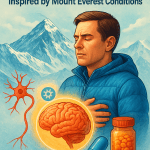This article is for informational purposes only and is not a substitute for professional medical advice. Always consult a healthcare provider for personal health concerns.
What Are Sleep Disorders?
n
Sleep disorders encompass a range of conditions that affect your ability to sleep well on a regular basis. These disorders can disrupt your sleep patterns, leading to daytime fatigue and affecting your overall health. Common types include insomnia, sleep apnea, restless legs syndrome, and narcolepsy. Understanding these disorders is crucial, as they can significantly impact your quality of life.
n
Types of Sleep Disorders
n
1. Insomnia
n
Insomnia is characterized by difficulty falling asleep, staying asleep, or waking up too early. It can be acute (short-term) or chronic (lasting more than a month). Stress, anxiety, and certain medications can contribute to insomnia. The pathophysiology of insomnia often involves dysregulation of the sleep-wake cycle and alterations in neurotransmitter activity, particularly involving gamma-aminobutyric acid (GABA) and serotonin. Insomnia can also be secondary to other medical conditions, such as chronic pain or hormonal changes, which complicates its treatment.
n
2. Sleep Apnea
n
Sleep apnea involves repeated interruptions in breathing during sleep. The most common type, obstructive sleep apnea, occurs when throat muscles relax excessively. This condition can lead to serious health issues, including heart disease and high blood pressure. Mechanistically, the repeated apneic events cause hypoxia, leading to sympathetic nervous system activation, which can result in cardiovascular strain and metabolic dysregulation. Interestingly, sleep apnea is often underdiagnosed; many individuals remain unaware of their condition, making awareness and screening essential.
n
3. Restless Legs Syndrome (RLS)
n
RLS is a condition that causes an uncontrollable urge to move your legs, often accompanied by uncomfortable sensations. Symptoms typically worsen at night, making it difficult to fall asleep. The exact mechanisms remain unclear, but it is believed to involve dopaminergic dysfunction and iron deficiency in the brain. RLS can also be exacerbated by lifestyle factors, such as prolonged inactivity or certain medications, which may complicate management strategies.
n
4. Narcolepsy
n
Narcolepsy is a neurological disorder that affects the brain’s ability to regulate sleep-wake cycles. Individuals may experience excessive daytime sleepiness and sudden sleep attacks during the day. This condition is often linked to a deficiency in hypocretin, a neurotransmitter that regulates arousal, wakefulness, and appetite. Narcolepsy can significantly impair daily functioning, and its symptoms may be mistaken for other conditions, leading to delays in diagnosis and treatment.
n
The Impact of Sleep Disorders on Health
n
Sleep disorders can have profound effects on both physical and mental health. Chronic sleep deprivation can lead to a variety of health issues, including:
n
1. Mental Health Problems
n
Sleep disorders are closely linked to mental health conditions such as anxiety and depression. Lack of sleep can exacerbate these issues, creating a vicious cycle. Research indicates that individuals with insomnia are at a higher risk of developing mood disorders, and addressing sleep issues can significantly improve mental health outcomes. Furthermore, sleep disturbances can contribute to cognitive decline, making it crucial to prioritize sleep for emotional well-being.
n
2. Cardiovascular Issues
n
Conditions like sleep apnea can increase the risk of heart disease, stroke, and hypertension. The repeated interruptions in breathing can strain the cardiovascular system. A study published in the Journal of the American College of Cardiology found that untreated sleep apnea significantly raises the risk of cardiovascular morbidity and mortality. Additionally, sleep deprivation can lead to increased levels of cortisol, a stress hormone that negatively impacts heart health.
n
3. Impaired Cognitive Function
n
Sleep is crucial for cognitive processes. Sleep disorders can impair attention, alertness, concentration, reasoning, and problem-solving skills. A lack of restorative sleep can hinder the brain’s ability to consolidate memories and process information, leading to decreased productivity and increased errors. For example, studies have shown that sleep-deprived individuals perform similarly to those under the influence of alcohol, highlighting the importance of adequate sleep for cognitive function.
n
Improving Sleep Quality
n
While sleep disorders can be challenging, there are effective strategies to improve sleep quality:
n
1. Maintain a Consistent Sleep Schedule
n
Going to bed and waking up at the same time each day helps regulate your body’s internal clock. Try to stick to this schedule even on weekends. This consistency can help improve sleep quality and duration over time. Consider using an alarm to remind you of bedtime, and avoid napping during the day if it interferes with your nighttime sleep.
n
2. Create a Relaxing Bedtime Routine
n
Engage in calming activities before bed, such as reading or taking a warm bath. Avoid screens, as the blue light emitted can interfere with melatonin production. Consider incorporating mindfulness practices, like meditation or gentle yoga, to help ease the transition to sleep. Journaling can also be beneficial; writing down your thoughts may help clear your mind and reduce anxiety.
n
3. Optimize Your Sleep Environment
n
Your bedroom should be conducive to sleep. Keep it dark, quiet, and cool. Consider using blackout curtains, earplugs, or a white noise machine. Additionally, investing in a comfortable mattress and pillows can significantly enhance your sleep quality. Personalize your sleep environment with calming scents, such as lavender, which may promote relaxation.
n
4. Limit Stimulants and Alcohol
n
Avoid caffeine and nicotine in the hours leading up to bedtime. While alcohol may make you feel sleepy initially, it can disrupt your sleep later in the night. Instead, consider herbal teas or warm milk as soothing alternatives. Be mindful of hidden sources of caffeine, such as chocolate or certain medications, which can affect your sleep quality.
n
When to Seek Help
n
If you suspect you have a sleep disorder, it’s important to consult a healthcare professional. They may recommend a sleep study to diagnose the issue accurately. Treatment options vary based on the disorder but can include lifestyle changes, therapy, and medication. Cognitive Behavioral Therapy for Insomnia (CBT-I) has shown significant efficacy in treating insomnia and is often recommended as a first-line treatment. Additionally, if you experience symptoms like loud snoring or gasping for air during sleep, it’s crucial to seek evaluation for sleep apnea.
n
Myth vs. Fact
n
Myth: You can catch up on sleep during the weekends.
n
Fact: While sleeping in on weekends can help alleviate some sleep debt, it doesn’t fully compensate for the effects of chronic sleep deprivation. Consistent sleep patterns are key to maintaining overall health. Catching up on sleep may also disrupt your circadian rhythm, making it harder to maintain a regular sleep schedule.
n
Myth: Sleep disorders only affect older adults.
n
Fact: Sleep disorders can affect people of all ages, including children and young adults. For instance, adolescents are particularly vulnerable to sleep issues due to changes in their biological clocks and lifestyle factors. Sleep disorders in children can lead to academic challenges and behavioral issues, making early intervention essential.
n
Patient Vignette
n
Meet Sarah, a 34-year-old teacher who struggled with insomnia for years. Despite her busy schedule, she found it hard to wind down at night. After trying various remedies without success, she consulted a sleep specialist. Through cognitive behavioral therapy for insomnia (CBT-I) and lifestyle changes, Sarah learned to manage her sleep better. She established a calming bedtime routine, reduced screen time, and created a sleep-friendly environment. Now, she enjoys restful nights and feels more energized during the day. Her experience highlights the importance of seeking professional help when sleep issues persist and the effectiveness of tailored interventions.
n
Frequently Asked Questions
n
1. What are the common signs of sleep disorders?
n
Common signs include difficulty falling asleep, frequent awakenings, excessive daytime sleepiness, and irritability. Monitoring your sleep patterns can help identify these issues. Keeping a sleep diary can provide insight into your habits and help you recognize triggers for poor sleep.
n
2. How can I tell if I have a sleep disorder?
n
If you consistently experience poor sleep quality and it affects your daily life, it’s advisable to consult a healthcare professional. They may conduct a sleep study to assess your sleep patterns. Look for patterns such as how long it takes you to fall asleep and how often you wake during the night.
n
3. Are sleep disorders treatable?
n
Yes, many sleep disorders are treatable through lifestyle changes, therapy, or medication, depending on the specific disorder. Early intervention can lead to better outcomes. It’s essential to work with a healthcare provider to create a personalized treatment plan that addresses your specific needs.
n
4. Can sleep disorders lead to other health problems?
n
Yes, untreated sleep disorders can lead to various health issues, including heart disease, diabetes, and mental health disorders. Addressing sleep problems is crucial for overall health. Chronic sleep deprivation can also weaken the immune system, making you more susceptible to illness.
n
5. What lifestyle changes can improve sleep?
n
Maintaining a consistent sleep schedule, creating a relaxing bedtime routine, and optimizing your sleep environment can significantly improve sleep quality. Consider keeping a sleep diary to track your habits and identify patterns. Additionally, regular physical activity can promote better sleep, but try to avoid vigorous exercise close to bedtime.
n
6. Is it normal to have trouble sleeping occasionally?
n
Yes, occasional sleepless nights are common. However, if it becomes frequent, it may be a sign of a sleep disorder. It’s essential to address persistent issues early to prevent further complications. Consider evaluating your lifestyle and stress levels, as these can significantly impact sleep quality.
n
7. What are some common misconceptions about sleep?
n
One common myth is that napping is always detrimental to nighttime sleep. In reality, short naps can be beneficial if they don’t interfere with your nightly rest. Another misconception is that older adults need less sleep; while sleep patterns may change, the need for restorative sleep remains. Additionally, many believe that all sleep medications are safe; however, they can have side effects and should be used cautiously under medical supervision.
Key Takeaways
- Sleep disorders can significantly impact your health and daily life.
- Common sleep disorders include insomnia, sleep apnea, and restless legs syndrome.
- Improving sleep hygiene can enhance sleep quality and overall well-being.
- Consulting a healthcare professional is crucial for persistent sleep issues.
- Myths about sleep disorders can lead to misunderstandings about treatment and prevention.
- Cognitive Behavioral Therapy for Insomnia (CBT-I) is an effective treatment option.
References
- American Academy of Sleep Medicine. (2021). Sleep Disorders. Retrieved from https://aasm.org
- National Heart, Lung, and Blood Institute. (2022). Sleep Apnea. Retrieved from https://nhlbi.nih.gov
- World Health Organization. (2020). Sleep Disorders. Retrieved from https://who.int
- Centers for Disease Control and Prevention. (2021). Sleep and Sleep Disorders. Retrieved from https://cdc.gov
- National Institute of Neurological Disorders and Stroke. (2023). Narcolepsy Fact Sheet. Retrieved from https://ninds.nih.gov
- PubMed Central. (2020). The Impact of Sleep Disorders on Health. Retrieved from https://pubmed.ncbi.nlm.nih.gov
- UpToDate. (2023). Overview of Sleep Disorders. Retrieved from https://uptodate.com








Post a comment